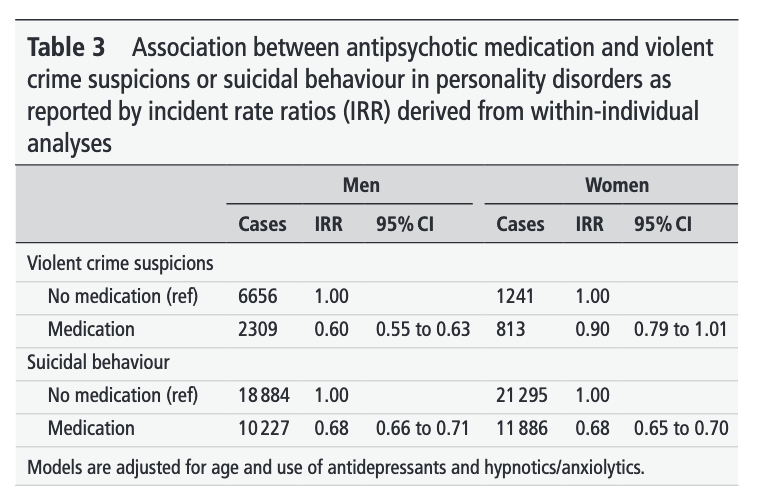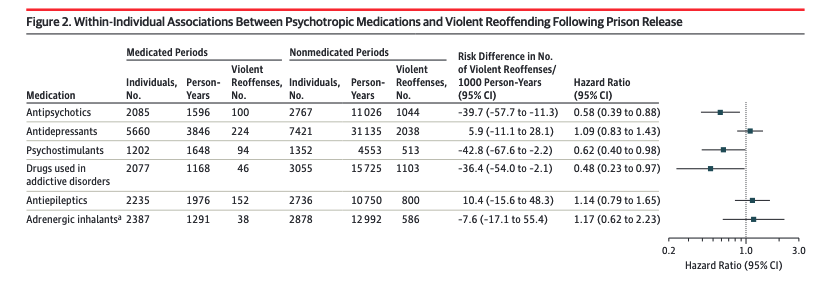
New paper! Antipsychotics are widely prescribed in people with personality disorders. Using Danish population registers, we examined links between these medications and self-harm, suicide, and being charged with violent crimes? Short 🧵 @EBMentalHealth #OA 

Primary analysis was to use a within-individual design to test associations between those dispensed antipsychotics and adverse outcomes. This design examines outcome rates when someone is dispensed (i.e. prescribed and collected) meds compared to when they are not dispensed meds
Included all diagnosed with personality disorders in mental health services during 2007-2016 (n=166k). Antipsychotics: ACT codes N05A (esp. quetiapine, olanzapine, risperidone). Outcomes: self-harm and suicide mortality, and suspicions for violent crimes (from national registers)
Results - 48% of the cohort were dispensed antipsychotics at least once. Most common PD categories were: borderline/emotionally unstable, abnxious and mixed/other.
Main findings - clear associations with reduced rates of violent crime suspicions and suicidal behaviours in men, and reduced suicidal behaviours in women. 

We investigated individual PD categories - no clear differences with suicidal outcomes. Some suggestion - needs replication - that antipsychotics have stronger associations with violent criminality in dissocial/antisocial PD than some other PDs 

We used adrenergic inhalants as a negative control - and found no association with either outcome. Adding lithium to antipsychotics did not seem to change pattern of associations - and possibly less strong effects in men.
Implications? It's an observational study, so will need triagulation with other study designs. But trials are very very difficult to conduct in this population - especially for relatively rare outcomes (see, e.g., CALMED trial - journals.sagepub.com/doi/full/10.11… led by co-author Crawford)
But consistent with research finding clear associations between antipsychotics and lower rates violent criminality in general pop (thelancet.com/journals/lance…; pubmed.ncbi.nlm.nih.gov/33691828/, and released prisoners (jamanetwork.com/journals/jama/…). Findings from cohort of released prisoners: 

So in the absence of trial evidence, short-term use of antipsychotics could be considered in high risk persons - bearing in mind side effects, need for physical health monitoring. Also questions co-admin of lithium as first-line strategy to prevent suicidality and violence
Mechanisms? We did not examine this - but direct effects on impulsivity, paranoid thoughts, comorbid drug misuse, emotional lability are possibilities. Non-specific factors such as regular and consistent contact with mental health services may be relevant.
In summary - this real-world study suggests that potential effects of antipsychotics on suicidal and violent behaviours can be taken into account when considering how to reduce risks in people with personality disorders
many thanks to super collaborators - esp. Kimmo Herrtua @UniSouthDenmark for leading on data, analyses, and much more; Mike Crawford @ImpPsych, Tapio Paljarvi.
Oh yes, link to paper: ebmh.bmj.com/content/early/…
• • •
Missing some Tweet in this thread? You can try to
force a refresh









